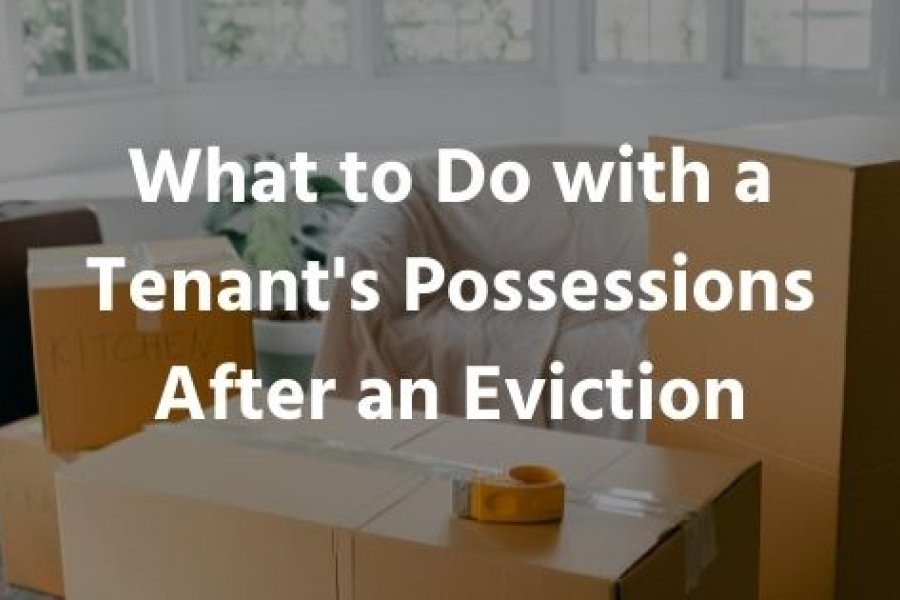
No matter how thorough your tenant screening process maybe, you’re bound to encounter a difficult tenant at some point in your career. And even after a successful eviction process, you may still have another headache to deal with, their personal belongings.
After being evicted, it’s possible for a tenant to leave their stuff behind. Unfortunately, removing your tenant’s possessions isn’t as easy as just throwing them out. Regardless of whether it’s trash or not, the items may still bear some value to your tenant.
Now, as a landlord, you have some responsibilities when it comes to handling a tenant’s possession. You must ensure that your tenant has a fair chance to retrieve them before you can dispose them of.
Failure to follow the due process can turn to be a costly affair to you. So here’s everything you need to know about what to do with a tenant’s possessions after an eviction.
What is the Reason for Their Eviction?
This is the first thing that you need to consider in order to understand your next course of action. Depending on the cause of the eviction, you’ll know exactly what your responsibilities in regards to their possessions are.
Every state has varying sets of laws in regards to what a landlord must do to a tenant’s possessions after an eviction. In North Carolina, it varies depending on the circumstances of abandonment.

Disposing of Abandoned Property
As a North Carolina landlord, your options for disposing of your tenant’s possessions depend on the circumstances of abandonment.
1. Does the Abandoned Property Have a Maximum Value of $750?
If so, you must notify your tenant by mail using their last known address. In the notice, you must let them know where their property is being held.
If the tenant doesn’t respond, you can take the property to a nonprofit organization that caters to people in need. The organization must, however, not dispose of the property immediately.
They must wait for at least 30 days before disposing of the property. If the tenant claims it within 30 days, they must hand over the property back to them.
2. Does the Abandoned Property Have a Maximum Value of $500?
If the value of the property left behind is less than $500, you can treat it as abandoned 5 days after a successful eviction. After 5 days, you’ll be at liberty to throw away the property.
3. Does the Abandoned Property Have a Value of at least $500?
If the value of the property is $750 or less, you can choose to offer it for donation. Otherwise, you must keep it for 7 days. And if you desire, you can choose to store it elsewhere.

During the 7 days, you must return the property if the former tenant asks for it. If you wish to sell it, you must provide your tenant with a 7-days notice of sale. You must mail the notice to your tenant’s last known address.
In the notice, you must include certain information such as the time, date, and location of the sale. In addition, you must also state the following three things:
- That you’ll apply any proceeds from the sale of the property towards unpaid rent, property damage, sale costs, and storage fees.
- That the tenant can make a claim on surplus money generated from the sale of their property. They have exactly seven days to make the claim after the sale.
- That you’ll deliver any surplus funds generated from the sale to the county or local government. You must do so within a period of 8 days.
Storage & Disposal
It’s possible for an evicted tenant to leave behind a large number of items. You may be at loss for where to start addressing the issue. The following is what you should do to remove the tenant’s property:
1. Remove Trash
Begin the removal process by getting rid of any trash. If you incur any costs of doing so, make sure to keep track of it.
2. Take a Full Inventory of the Tenant’s Possessions
After getting rid of the trash, the next step should be to take an inventory of the remaining belongings. Ideally, take photos of all the items.

3. Store the Property
The next thing would be to store the property. You have two options here, to store them on the property or to rent a storage unit. Renting a storage unit away from your property may be the best option for you because you’ll want to prepare the rental for the next tenant.
4. Notify the Tenant
As already mentioned, in North Carolina, you must let your tenant know of any property they’ve left behind depending on the value. For abandoned property that’s at least $750, you must store the property for seven days after an eviction.
During that time, you must return the property to the tenant if they request it.
5. Dispose of the Property
If the tenant doesn’t come to retrieve the property, you can choose to dispose it of. Again, in North Carolina, how you dispose of the property should be dependent on the value.
6. Account for Any Incurred Expenses
At this point, it’s important that you account for any expenses incurred in regards to moving, storing, and disposing of the property. You can use the proceeds from the sale to cover your expenses.

How to Protect Yourself in the Lease Agreement
As you’ve seen, getting stuck with your tenant’s possessions can prove to be a stressful, costly, and time-consuming situation. As such, make sure to mention the following in your lease agreement:
- Fee for disposing of abandoned property.
- Separate arrangements if a tenant isn’t able to move all their possessions right away.
- Details on how long you’ll be responsible for keeping their belongings after they move out.
Summary
Even after a successful eviction, you cannot simply throw your tenant’s belongings away. There is a process that every North Carolina landlord must follow. If you need help with any aspect of property management, reach out to the team at Schambs Property Management!